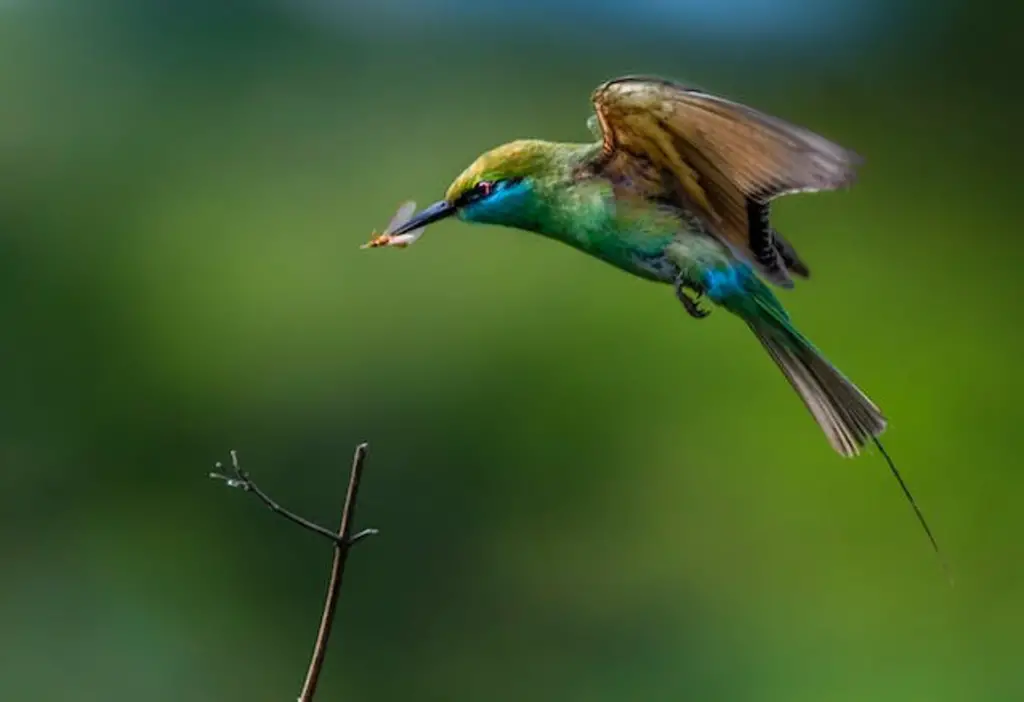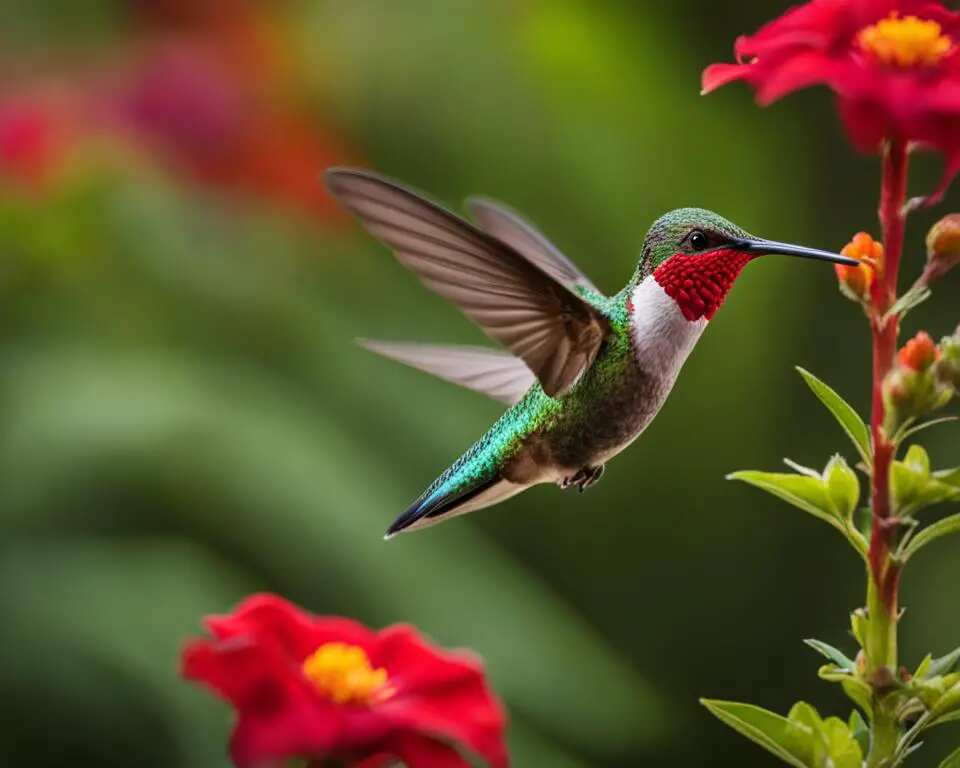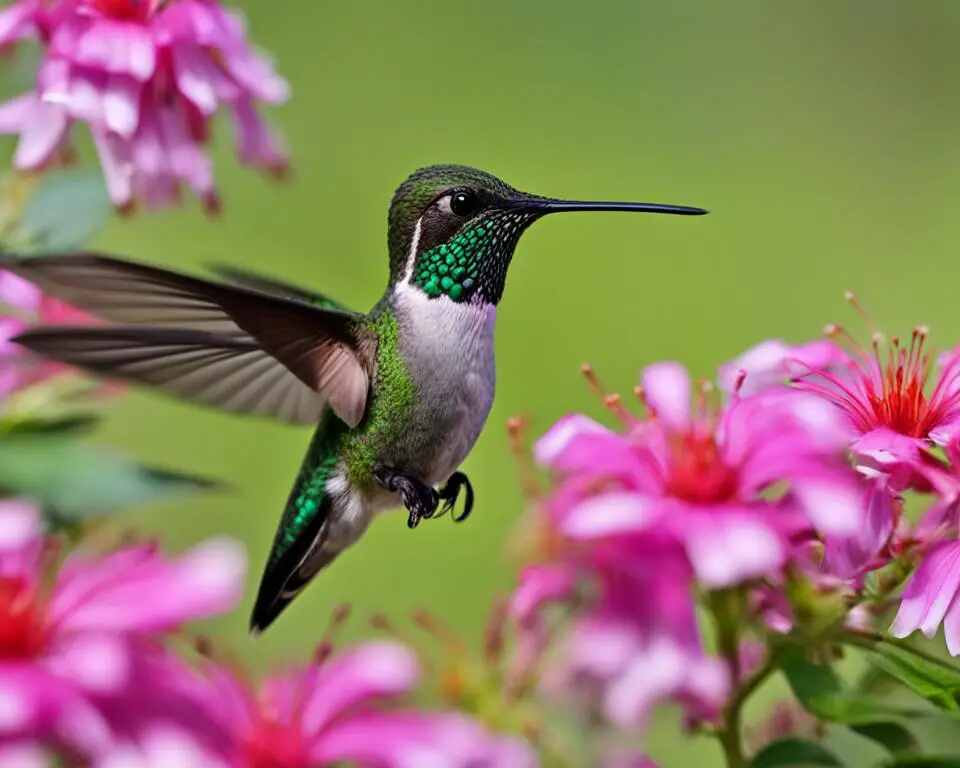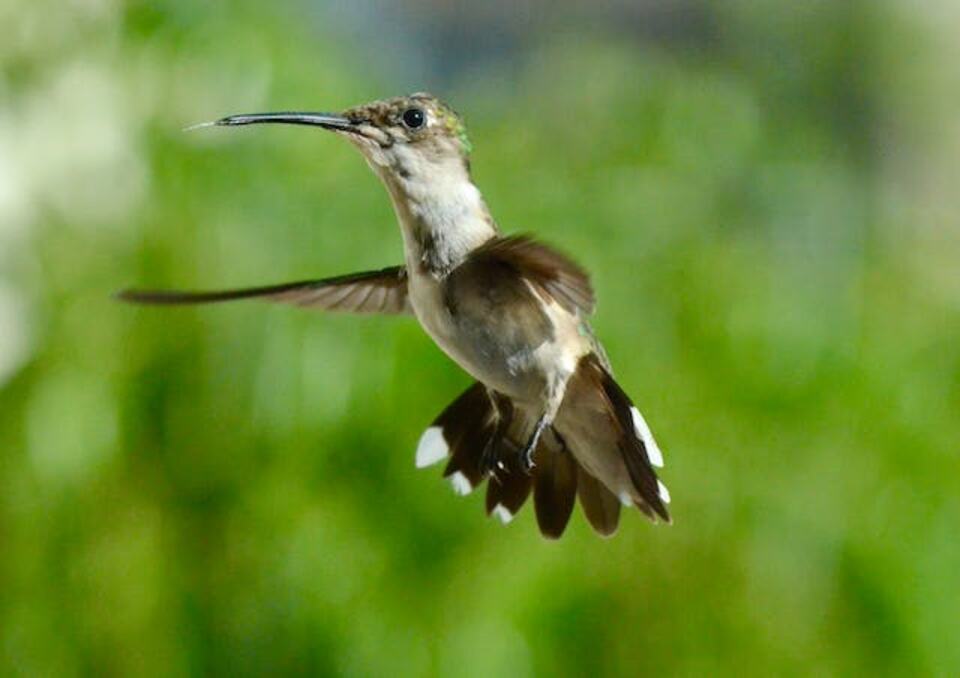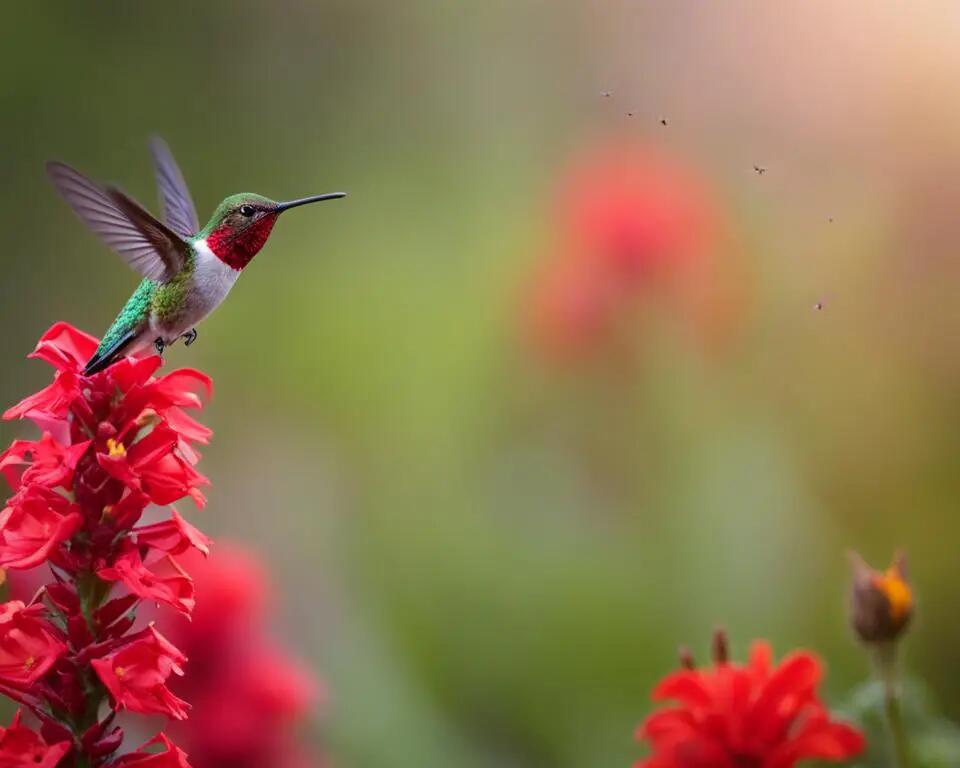Hummingbirds have always fascinated nature enthusiasts with their vibrant colors, delicate wings, and unique feeding habits. Many people wonder if these tiny birds, known for their love of nectar, also consume mosquitoes. In this article, we will explore the feeding habits of hummingbirds, their mosquito diet, and how to attract them to your yard.
Hummingbirds are primarily nectar feeders, but they have been observed consuming bugs and insects, including mosquitoes. With their exceptional vision and maneuverability, hummingbirds like the ruby-throated hummingbird can catch mosquitoes in flight. They are also known to feed on mosquito larvae found in stagnant water, which provides them with protein and essential nutrients.
While hummingbirds are not mosquito specialists, they will eat them if given the opportunity. Attracting hummingbirds to your yard can help control a small mosquito population while adding beauty to your outdoor space. Let’s dive deeper into the diet of hummingbirds and how you can create an inviting habitat for them.
Table of Contents
- 1 Key Takeaways:
- 2 Do Hummingbirds Eat Mosquitoes?
- 3 Understanding the Diet of Hummingbirds
- 4 The Role of Hummingbirds in Mosquito Control
- 5 Attracting Hummingbirds for Mosquito Control
- 6 Other Mosquito Control Methods
- 7 The Mutual Benefits of Hummingbirds and Flowers
- 8 The Role of Mosquitoes in Hummingbird Diet
- 9 Factors Affecting Hummingbird’s Mosquito Consumption
- 10 The Connection Between Hummingbirds and Mosquitoes
- 11 The Importance of Creating a Natural Habitat
- 12 Conclusion
- 13 FAQs:
- 13.1 How many mosquitoes can a hummingbird eat in a day?
- 13.2 Are hummingbirds effective in controlling mosquito populations?
- 13.3 How can I attract hummingbirds to my yard for mosquito control?
- 13.4 What are other mosquito control methods I can use in my garden?
- 13.5 How do hummingbirds benefit flowers?
- 13.6 How do mosquitoes contribute to the diet of hummingbirds?
- 13.7 What factors affect the mosquito consumption of hummingbirds?
- 13.8 Is there a direct connection between hummingbirds and mosquitoes?
- 13.9 How can I create a natural habitat in my garden to attract hummingbirds?
- 13.10 What is the importance of creating a natural habitat?
- 13.11 What is the role of hummingbirds in mosquito control?
- 14 Source Links
- 15 Author
Key Takeaways:
- Hummingbirds have been observed eating mosquitoes and their larvae.
- They primarily rely on nectar for sustenance but need insects for essential nutrients.
- Attracting hummingbirds to your yard can help control a small mosquito population.
- Creating a natural habitat with nectar-rich flowers and clean feeders can attract hummingbirds.
- Using multiple mosquito control methods alongside attracting hummingbirds is essential for effective pest management.
Do Hummingbirds Eat Mosquitoes?
Hummingbirds primarily sustain themselves on the sweet nectar of flowers, utilizing their specialized bills and long tongues for extraction. While nectar serves as their main energy source, hummingbirds supplement their diet with small insects and spiders to obtain essential proteins, vitamins, and minerals.
Mosquitoes are among the insects that may be consumed by hummingbirds, but they do not constitute a primary or exclusive part of their diet. The intake of insects serves as a supplementary source of nutrients and varies depending on the availability of flowers and insects in their environment, highlighting the adaptability of hummingbirds to diverse food sources for their nutritional needs.
Understanding the Diet of Hummingbirds
Hummingbirds have a diverse diet that consists of both nectar from flowers and insects. While nectar provides them with the necessary energy, insects are an essential source of protein. Hummingbirds are known to consume a variety of small flying insects, including ants, beetles, gnats, mosquitoes, and certain species of wasps. They also feed on insect eggs and larvae.
The specialized beaks of hummingbirds allow them to capture insects with precision and consume them whole. Insects make up about 80% of their diet, providing them with vital amino acids, lipids, and other nutrients. Their high metabolic rate and constant activity require a significant amount of food each day to sustain their energy levels.
Hummingbirds are not solely dependent on mosquitoes as a food source. They have a broad range of food preferences and will consume insects based on availability. However, their ability to catch mosquitoes in flight and feed on mosquito larvae found in stagnant water does contribute to the control of mosquito populations to some extent.
Hummingbird Diet: At a Glance
| Insects Consumed by Hummingbirds | Other Food Sources |
|---|---|
| Ants | Nectar from flowers |
| Beetles | Fruit juices |
| Gnats | Tree sap |
| Mosquitoes | Small spiders |
| Wasps | Occasional small fruits |
“While hummingbirds primarily rely on nectar, their consumption of insects, including mosquitoes, makes them valuable contributors to natural pest control.” – Hummingbird Expert
The Role of Hummingbirds in Mosquito Control
Hummingbirds, with their nimble flight and voracious appetite, can play a role in controlling mosquito populations in your yard. While they are not specialized mosquito predators, these tiny birds have a diverse diet that includes insects, such as mosquitoes. By attracting hummingbirds to your garden, you can harness their natural pest control abilities to help reduce the mosquito population.
Hummingbirds have a high metabolism and need a significant amount of food each day to sustain their energy levels. They consume a variety of small flying insects, including mosquitoes, which provide them with protein and other essential nutrients. However, for hummingbirds to effectively control mosquitoes, there needs to be a substantial number of them visiting the area regularly.
Creating a habitat that attracts hummingbirds is key to encouraging their presence and potential mosquito control. Planting nectar-rich flowers, such as snapdragons, morning glories, and trumpet-shaped flowers, will not only attract hummingbirds but also provide them with the necessary nourishment. Additionally, maintaining clean hummingbird feeders filled with fresh sugar water can further entice these tiny birds to frequent your yard.
To create an inviting environment for hummingbirds, it’s important to avoid using pesticides and insecticides that may harm both the hummingbirds and their insect prey. By prioritizing a natural approach to mosquito control, you can contribute to a balanced and sustainable ecosystem in your backyard.
Attracting Hummingbirds for Mosquito Control
Attracting hummingbirds to your garden can be an effective and natural way to help control the mosquito population. By creating a welcoming habitat with the right food sources, you can encourage these beautiful birds to visit your yard and consume mosquitoes as part of their diet. Here are some tips to attract hummingbirds for mosquito control:
- Plant nectar-rich flowers: Hummingbirds are attracted to brightly colored, trumpet-shaped flowers that produce plenty of nectar. Some examples include trumpet vine, bee balm, salvia, and petunias. Having a variety of flowers that bloom throughout the season will provide a continuous food source for hummingbirds.
- Offer clean hummingbird feeders: In addition to flowers, you can set up hummingbird feeders filled with a homemade nectar solution. Make sure to clean the feeders regularly to prevent the growth of harmful bacteria. Place the feeders in a shaded area where hummingbirds can easily find them.
- Create a water feature: Hummingbirds need fresh water for drinking and bathing. Adding a small birdbath or a fountain to your garden can attract hummingbirds and provide them with the water they need.
- Avoid pesticides: Using pesticides in your garden can harm not only mosquitoes but also the beneficial insects that hummingbirds rely on for food. Opt for natural pest control methods and try to create a balanced ecosystem that supports the overall health of your garden.
By implementing these strategies, you can make your garden a haven for hummingbirds and reduce the mosquito population naturally. Remember to be patient and provide a consistent food and water source to attract these delightful creatures. Enjoy the beauty of hummingbirds while they contribute to keeping mosquitoes at bay.
Table: Nectar-Rich Flowers to Attract Hummingbirds
| Flower | Scientific Name | Bloom Time |
|---|---|---|
| Trumpet Vine | Campsis radicans | Summer to fall |
| Bee Balm | Monarda didyma | Summer |
| Salvia | Salvia spp. | Summer to fall |
| Petunias | Petunia spp. | Spring to fall |
These are just a few examples of nectar-rich flowers that hummingbirds are attracted to. Planting a variety of these flowers in your garden will provide a diverse and abundant food source for hummingbirds.
Other Mosquito Control Methods
While attracting hummingbirds to your garden can help control mosquito populations, there are also other natural mosquito control methods you can implement to create a more effective defense against these pesky insects. By combining multiple strategies, you can significantly reduce the number of mosquitoes in your garden, promoting a more enjoyable outdoor experience.
Eliminating Breeding Sites
The first step in mosquito control is to eliminate their breeding sites. Mosquitoes lay their eggs in standing water, so removing any sources of stagnant water in your garden is crucial. This includes emptying birdbaths, flowerpot saucers, and any other containers that collect water.
By regularly inspecting your garden and ensuring there are no areas where water can accumulate, you can greatly reduce the number of mosquitoes that breed on your property.
Introducing Natural Predators
Introducing natural mosquito predators to your garden is another effective method of control. These 20 bird species plus dragonflies, bats, and certain fish species, such as mosquito fish, feed on mosquito larvae and can help keep their populations in check. Creating a habitat that attracts these natural predators, such as providing a water source for dragonflies or installing bat houses, can help naturally control mosquito populations.
Using Natural Repellents
Using natural mosquito repellents can also be an effective way to ward off these pests. Essential oils, such as citronella, lemongrass, and lavender, have been found to have mosquito-repelling properties. By planting these herbs in your garden or using their essential oils in candles or diffusers, you can create a more mosquito-hostile environment.
Additionally, wearing light-colored clothing and using fans to create airflow can help deter mosquitoes from landing on you.
| Mosquito Control Methods | Effectiveness | Cost |
|---|---|---|
| Attracting hummingbirds | Can contribute to mosquito control in small areas | Minimal cost |
| Eliminating breeding sites | Highly effective in reducing mosquito populations | No additional cost |
| Introducing natural predators | Can help control mosquito larvae | Varies depending on method |
| Using natural repellents | Provides temporary relief from mosquito bites | Varies depending on product |
By implementing these various mosquito control methods, you can create a more enjoyable outdoor environment while also promoting a healthier ecosystem. Remember to consider the specific needs of your garden and the level of mosquito infestation in your area when choosing which strategies to employ.
By taking a holistic approach to mosquito control, you can ensure a more pest-free and enjoyable outdoor experience for you and your family.
The Mutual Benefits of Hummingbirds and Flowers
Hummingbirds and flowers share a symbiotic relationship, benefiting each other in various ways. While hummingbirds primarily rely on nectar from flowers as their main source of food, they also contribute to the pollination of flowers, helping them reproduce and thrive.
At the same time, flowers provide the nectar that hummingbirds need to sustain their energy levels and fulfill their dietary requirements.
While hummingbirds are not specifically targeting mosquitoes as their prey, they do consume insects as part of their diet, which can include mosquitoes. This incidental consumption of mosquitoes by hummingbirds can have a positive impact on helping control mosquito populations to some extent.
However, it’s important to note that hummingbirds are not a reliable or comprehensive solution for mosquito control and should not be solely relied upon for this purpose.
In addition to their contribution to natural pest control, hummingbirds enhance the biodiversity of an ecosystem. By attracting hummingbirds to your garden with nectar-rich flowers, you can create a biodiverse environment that supports a wide variety of plant and animal species.
This increased biodiversity can help maintain a balanced ecosystem and reduce the prevalence of pests, including mosquitoes.
| Benefits of Hummingbirds | Benefits of Flowers |
|---|---|
| Natural Pest Control: Hummingbirds consume insects, including mosquitoes, which can help control mosquito populations to some extent. | Pollination: Hummingbirds transfer pollen between flowers, aiding in their reproduction and the production of fruits and seeds. |
| Biodiversity: Attracting hummingbirds to your garden can increase the diversity of plant and animal species, promoting a healthy ecosystem. | Nutrient Exchange: Flowers provide the nectar that hummingbirds need to sustain their energy levels and fulfill their dietary requirements. |
| Aesthetic Appeal: Hummingbirds are a source of beauty and fascination, enhancing the visual appeal of a garden or outdoor space. | Seed Dispersal: Hummingbirds can inadvertently aid in seed dispersal as they move from flower to flower, helping plants colonize new areas. |
By creating a natural habitat in your garden that attracts hummingbirds and supports their dietary needs, you can enjoy the beauty of these charismatic birds while contributing to a healthier and more balanced ecosystem.
While hummingbirds may consume mosquitoes as part of their varied diet, their primary role is as pollinators and contributors to biodiversity rather than mosquito control specialists.
The Role of Mosquitoes in Hummingbird Diet
Mosquitoes play a small but significant role in the diet of hummingbirds. While hummingbirds primarily rely on nectar from flowers for their energy and sugar intake, they also consume insects to meet their protein and nutrient requirements.
Mosquitoes provide a readily available food source for hummingbirds due to their small size and soft consistency, making them easily digestible. Hummingbirds have been observed capturing mosquitoes in flight and consuming them whole. They may also feed on mosquito larvae found in pools of stagnant water.
Although mosquitoes are not the sole focus of a hummingbird’s diet, their consumption contributes to the overall nutritional needs of hummingbirds. Hummingbirds have evolved to have specialized beaks that allow them to capture small insects with precision. While they primarily rely on nectar and insects, including mosquitoes, they may also consume spiders and other small arthropods.
It’s important to note that the prevalence of mosquitoes in a hummingbird’s diet can vary depending on factors such as the availability of mosquitoes, the variety and abundance of other insects in the area, and the nutritional requirements of the hummingbird species.
Therefore, while hummingbirds can help control a small mosquito population in their immediate surroundings, relying solely on them for mosquito control may not be effective in larger areas.
It’s crucial to implement multiple mosquito control methods, such as removing stagnant water, using natural repellents, and encouraging a diverse ecosystem with other mosquito predators, for effective mosquito management.
Hummingbird Diet and Mosquitoes: A Summary
- Hummingbirds primarily rely on nectar from flowers for energy and sugar intake.
- They consume insects, including mosquitoes, to meet their protein and nutrient requirements.
- Hummingbirds have specialized beaks that allow them to catch mosquitoes in flight and consume them whole.
- The prevalence of mosquitoes in a hummingbird’s diet can vary depending on various factors.
- Relying solely on hummingbirds for mosquito control may not be effective in larger areas.
| Hummingbird Diet | Mosquito Predation |
|---|---|
| Nectar from flowers | Small insects, including mosquitoes |
| Insects (80% of diet) | Protein and nutrient source |
| Mosquito larvae in stagnant water | Easily digestible food |
Factors Affecting Hummingbird’s Mosquito Consumption
Hummingbirds have diverse feeding habits that include consuming mosquitoes, although mosquitoes are not their sole food source. The amount of mosquitoes consumed by hummingbirds can vary depending on various factors. One of these factors is the availability of mosquitoes in the area. If there is a high population of mosquitoes, hummingbirds may consume more of them in their diet.
However, the variety of insects in the area also plays a role in the hummingbird’s feeding habits. If there is a wide range of insects available, hummingbirds may consume mosquitoes along with other insects that provide the necessary nutrients.
The mosquito population in a particular area can also influence the hummingbird’s mosquito consumption. If the mosquito population is low, hummingbirds may have fewer opportunities to feed on mosquitoes. On the other hand, a higher mosquito population can provide more opportunities for hummingbirds to consume mosquitoes as part of their diet.
It’s important to note that hummingbirds are not exclusively dependent on mosquitoes and can adjust their feeding habits based on the availability of other insects. Their diet is diverse and includes a variety of small flying insects.
To ensure a healthy and balanced diet, hummingbirds consume a combination of nectar, insects, and spiders. While mosquitoes contribute to the protein and nutrient intake of hummingbirds, they are just one part of their overall diet.
Factors such as the nutritional requirements of the hummingbirds and the availability of other insects influence their feeding habits. The diet of hummingbirds is adaptable, allowing them to survive and thrive in different environments where a variety of food sources are present.
Example of Factors Affecting Hummingbird’s Mosquito Consumption
Table: Factors Affecting Hummingbird’s Mosquito Consumption
| Factors | Effect on Mosquito Consumption |
|---|---|
| Availability of mosquitoes | If mosquitoes are abundant, hummingbirds may consume more of them in their diet. |
| Variety of insects | If there is a wide range of insects available, hummingbirds may consume mosquitoes along with other insects that provide the necessary nutrients. |
| Mosquito population | A higher mosquito population can provide more opportunities for hummingbirds to consume mosquitoes. Conversely, a low mosquito population may result in fewer opportunities for mosquito consumption. |
| Nutritional requirements | Hummingbirds adjust their feeding habits based on their nutritional needs, which may influence their consumption of mosquitoes. |
The Connection Between Hummingbirds and Mosquitoes
Hummingbirds and mosquitoes share a complex relationship in outdoor environments. While hummingbirds are not actively seeking out and relying on mosquitoes as a primary food source, they may consume them incidentally. Hummingbirds primarily feed on nectar from flowers and also rely on insects for protein in their diet.
Mosquitoes, being attracted to the nectar of flowers and hummingbird feeders, can become an incidental food source for hummingbirds as they forage for nectar or flying insects. With their agile flight and precise beak structure, hummingbirds are capable of catching mosquitoes in the air and consuming them.
It’s important to note that mosquitoes are not a staple in the diet of hummingbirds. While hummingbirds may consume mosquitoes when they come across them, they also rely on a variety of other insects and spiders for their nutritional needs.
Hummingbirds have evolved to be generalist feeders, and their diet includes a wide range of small flying insects, such as ants, beetles, gnats, and certain species of wasps. Additionally, hummingbirds may feed on insect eggs and larvae, including mosquito larvae found in stagnant pools of water.
Creating a natural habitat in your garden can attract hummingbirds and promote a balanced ecosystem. By planting a variety of nectar-rich flowers that bloom throughout the season, you can provide a consistent food source for hummingbirds.
Avoiding the use of pesticides and insecticides is crucial in maintaining a healthy environment for hummingbirds and other beneficial insects. With the presence of hummingbirds and their consumption of insects, including mosquitoes, you can contribute to natural pest control in your outdoor space.
Overall, while hummingbirds may consume mosquitoes, they are not solely reliant on them as a food source. Their diet consists of a variety of insects, nectar, and spiders. By understanding the connection between hummingbirds and mosquitoes, we can appreciate the important role that hummingbirds play in maintaining ecological balance and promoting natural pest control in our gardens.
The Importance of Creating a Natural Habitat
To attract hummingbirds and promote natural pest control, it is crucial to create a natural habitat in your garden. By prioritizing a natural garden, you can enjoy the beauty of hummingbirds while contributing to a balanced and sustainable environment.
Planting a variety of nectar-rich flowers that bloom throughout the season can provide a consistent food source for hummingbirds. Some common flowers that attract hummingbirds include snapdragons, morning glories, fuchsias, and trumpet-shaped flowers. These vibrant blooms not only provide a valuable source of nectar for hummingbirds but also add beauty and color to your garden.
In addition to flowers, it is important to avoid using pesticides and insecticides in your garden. These chemicals can harm not only the targeted pests but also beneficial insects and birds, including hummingbirds. By adopting natural pest control methods and avoiding harmful chemicals, you can create a safe and inviting environment for hummingbirds to thrive.
Creating a biodiverse garden with a healthy ecosystem supports the overall well-being of hummingbirds. A diverse range of plants attracts a variety of insects, which in turn provides a diverse and nutritious diet for hummingbirds. This biodiversity contributes to the long-term health and survival of both hummingbirds and the plants they rely on for food.
Benefits of Creating a Natural Habitat for Hummingbirds:
- Provides a consistent food source through nectar-rich flowers
- Supports natural pest control without harmful chemicals
- Encourages biodiversity and a healthy ecosystem
- Contributes to the long-term health and survival of hummingbirds
By attracting hummingbirds to your garden and creating a natural habitat, you can enjoy the beauty of these incredible creatures while playing a crucial role in preserving their populations and promoting a more sustainable environment.
Conclusion
After exploring the fascinating world of hummingbirds and their diet, it is clear that they do consume mosquitoes, although it is not their primary food source. Hummingbirds rely on a diverse variety of insects, including mosquitoes, to obtain the protein and nutrients they need. While they can contribute to mosquito control in a small area, it’s important to understand that they also consume other insects as part of their diet.
Creating a habitat that attracts hummingbirds is a natural and eco-friendly way to help control mosquito populations. By planting nectar-rich flowers and providing clean hummingbird feeders, we can encourage these beautiful creatures to visit our gardens. However, it is crucial to remember that relying solely on hummingbirds for mosquito control may not be effective in larger areas.
To effectively reduce mosquito populations, it is recommended to combine attracting hummingbirds with other mosquito control methods. Removing standing water where mosquitoes breed, introducing natural predators like dragonflies and bats, and using natural mosquito repellents can all contribute to a more comprehensive approach to mosquito control.
In conclusion, while hummingbirds do eat mosquitoes, they are not mosquito specialists. By understanding their feeding habits and creating a natural habitat, we can enjoy the benefits of hummingbirds while also helping to control mosquitoes and promoting a balanced ecosystem in our gardens.
FAQs:
How many mosquitoes can a hummingbird eat in a day?
Hummingbirds eat dozens of mosquitoes daily as part of their insect intake. However, the exact number varies based on species, size, and food availability. Nectar from flowers remains their primary energy source.
Are hummingbirds effective in controlling mosquito populations?
Hummingbirds can help control a small mosquito population in a garden, but they are not solely dedicated to eating mosquitoes. Other mosquito predators can also contribute to mosquito control.
How can I attract hummingbirds to my yard for mosquito control?
You can attract hummingbirds by creating a natural garden with nectar-rich flowers and offering clean hummingbird feeders with fresh sugar water. Placing the feeders in a shaded area and having multiple feeders can help attract and accommodate more hummingbirds.
What are other mosquito control methods I can use in my garden?
In addition to attracting hummingbirds, you can eliminate standing water where mosquitoes breed, introduce natural mosquito predators like dragonflies and bats, and use natural mosquito repellents.
How do hummingbirds benefit flowers?
Hummingbirds and flowers have a mutually beneficial relationship. Hummingbirds rely on the nectar of flowers as a food source, while flowers rely on hummingbirds for pollination.
How do mosquitoes contribute to the diet of hummingbirds?
Mosquitoes provide hummingbirds with protein and other nutrients. While they are not their primary food source, hummingbirds will consume mosquitoes if they come across them.
What factors affect the mosquito consumption of hummingbirds?
The availability of mosquitoes, the variety of insects in the area, and the nutritional requirements of hummingbirds can all affect their mosquito consumption.
Is there a direct connection between hummingbirds and mosquitoes?
Hummingbirds and mosquitoes coexist in outdoor environments. While hummingbirds are not actively seeking out mosquitoes, they may eat them if they encounter them while foraging.
How can I create a natural habitat in my garden to attract hummingbirds?
Planting a variety of nectar-rich flowers and avoiding pesticides and insecticides can help create a natural habitat that attracts hummingbirds and supports a healthy ecosystem.
What is the importance of creating a natural habitat?
Creating a natural habitat benefits both hummingbirds and other wildlife, promotes pollination, and helps control pest populations naturally.
What is the role of hummingbirds in mosquito control?
While hummingbirds can contribute to mosquito control in a small area, it’s important to use multiple methods and consider the overall ecosystem to effectively reduce mosquito populations.

